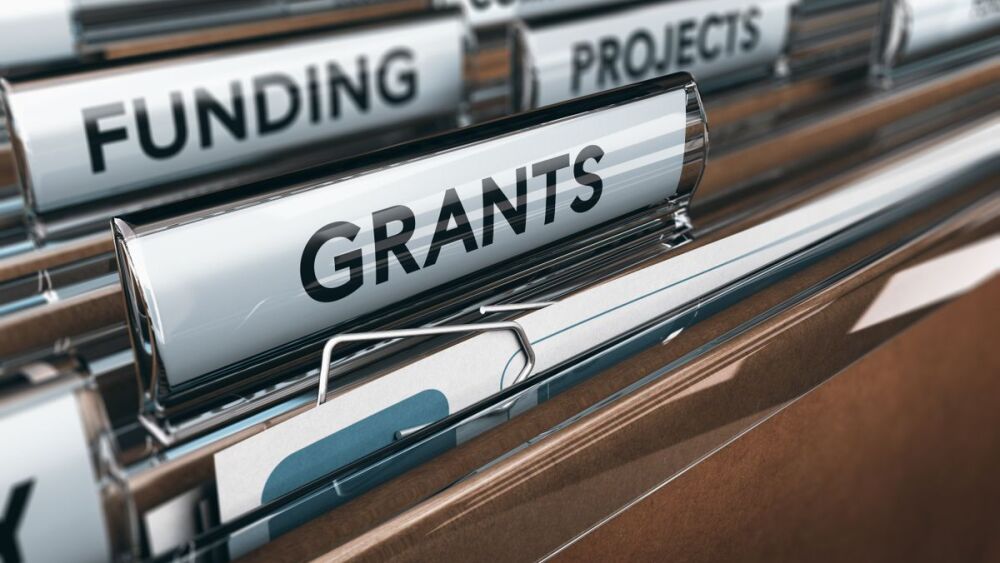Looking to navigate the complexities of grants funding? Lexipol is your go-to resource for state-specific, fully-developed grants services that can help fund your needs. Find out more about our grants services here.
The Department of Justice (DOJ) Fiscal Year 2025 Program Plan is a crucial resource that outlines several key funding opportunities for law enforcement and public safety agencies. While the plan was removed from the DOJ website earlier this year, it was recently reposted on March 20. Due to the high volume of anticipated solicitations in the very near future, it is crucial that departments prepare now.
Notable upcoming programs include the Body-Worn Camera Implementation Program ($35M), Virtual Reality De-escalation Initiative ($5.5M), and Justice and Mental Health Collaboration Program ($15.95M), which are all expected to be released during the federal fiscal calendar in Q3 (April–June). The STOP School Violence Program ($83M) and Edward Byrne JAG grants (Local: $80M; State: $100M) also remain central funding sources.
Key COPS Office programs also expected soon include the COPS Hiring Program ($157M), Safer Outcomes ($20M), CPD Microgrants ($5M), and LEMHWA ($10M). Agencies interested in school safety should monitor the School Violence Prevention Program (SVPP) ($73M).
While exact deadlines are not yet posted, the plan indicates upcoming activity primarily in Q3 (April – June) and Q4 (July – September) of the federal fiscal calendar.
Agencies are advised to subscribe to DOJ and PoliceOne grant alerts to track announcements and begin preparations immediately. The full DOJ plan, which is subject to modifications, is available here: DOJ Program Plan.
The Lexipol Grant Assistance Program emphasizes the importance of preparing now since DOJ solicitations are subject to rapid releases and changes, with no advance notice. DOJ grants generally follow a two-part application process, requiring submission through Grants.gov and the JustGrants Justice Grants System. Registration for these systems can take time so don’t wait until the grants have already been announced to get started.
The following is an overview of other key Bureau of Justice Assistance (BJA) and Community Oriented Policing Services (COPS) Office funding opportunities anticipated for FY25:
Bureau of Justice Assistance (BJA) Grant Programs
Body-Worn Camera Policy and Implementation Program
- Total Funding: $35,000,000
- Maximum Award: $400,000 per applicant
- Eligible Applicants: Federally Recognized Tribes and Government Entities
- Estimated Release: Q3 (April - June)
- Purpose: Supports law enforcement agencies in piloting, establishing, or enhancing body-worn camera (BWC) programs. Funding covers the purchase or lease of cameras, with an emphasis on adherence to strong policy frameworks.
- Funding Categories:
- Law Enforcement Agencies
- State Correctional Agencies
- Digital Evidence Management and Integration
- Prosecutors’ Use of BWC Footage
- Training and Constitutional Policing Initiatives
Specialty Courts and Reentry Programs
- Funding Allocations:
- Adult Treatment Court: $89,000,000
- Community Courts: $8.9 million
- Veterans Treatment Court: $32,000,000
- Objective: To support treatment and intervention courts, along with reentry initiatives aimed at reducing recidivism.
Virtual Reality De-escalation Site-Based Initiative
- Total Funding: $5,500,000
- Maximum Award: $800,000
- Estimated Release: Q3 (April - June)
- Expected Awards: 7
- Eligible Applicants: Educational Institutions, NGOs, Federally Recognized Tribes, Government Entities
- Purpose: Supports the advancement of virtual reality-based de-escalation training, particularly for crisis intervention training (CIT) for encounters involving individuals experiencing mental health crises.
Justice and Mental Health Collaboration Program (JMHCP)
- Total Funding: $15,950,000
- Maximum Award: $550,000
- Estimated Awards: 29
- Eligible Applicants: States, Tribes, Local Governments (must partner with mental health authorities)
- Funding Categories:
- Local, Tribal, and County Government Justice and Behavioral Health Collaboration
- State Government Justice and Behavioral Health Collaboration
- Purpose: Enhances collaboration between justice and behavioral health systems to improve responses for individuals with mental health disorders (MHD) or co-occurring substance use disorders.
STOP School Violence Program
- Total Funding: $83,000,000
- Estimated Awards: 79
- Average Award: $1,000,000
- Purpose: Supports training, school security improvements, and violence prevention measures. Unlike the COPS School Violence Prevention Program (SVPP), this program generally does not require a match.
Projects focused on target hardening should be submitted under the COPS SVPP application.
Edward Byrne Memorial Justice Assistance Grant (JAG) Program
- Total Funding:
- Local Allocations: $80,000,000 (1,200 entities)
- State Allocations: $100,000,000
- Purpose: Provides broad funding for crime prevention and control efforts, including law enforcement, corrections, drug treatment, crime victim services, mental health crisis intervention, and court initiatives.
- Purpose Areas:
- Law enforcement programs
- Prosecution and court programs
- Prevention and education programs
- Corrections and community corrections programs
- Drug treatment and enforcement programs
- Planning, evaluation, and technology improvement programs
- Crime victim and witness programs (other than compensation)
- Mental health programs and related law enforcement and corrections initiatives
- Behavioral programs focused on risk reduction
Community-Based Violence Intervention and Prevention Initiative (CVIPI)
- Total Funding: $59,000,000
- Maximum Award: $2,000,000
- Estimated Awards: 26
- Purpose: Supports comprehensive, evidence-based violence prevention programs, including gang and gun violence reduction initiatives.
Project Safe Neighborhoods (PSN) Formula Grants
- Total Funding: $19,000,000
- Estimated Awards: 100
- Average Award: $190,000
- Estimated Release: Q4 (July - September)
- Purpose: Supports multi-agency collaboration to combat violent crime through partnerships between law enforcement and community organizations.
Agencies interested in this resource should reach out to their U.S. Attorney’s Office for their district to discuss strategies to address gang and gun-related activities.
Community Oriented Policing Services (COPS) Grant Programs
COPS Hiring Program (CHP)
- Total Funding: $157,000,000
- Purpose: Supports salary and benefits for entry-level law enforcement officers.
COPS Anti-Meth and Anti-Heroin Task Force Grants
- Total Funding: $50,000,000+ (combined)
- Purpose: Provides resources for state agencies combatting methamphetamine and heroin distribution.
Local agencies should reach out to their State partners to be considered for assistance in addressing these issues in your community.
Community Policing Development (CPD) Promoting Access to Crisis Intervention Teams (PACT) Program
- Total Funding: $4,000,000
- Maximum Award: $400,000
- Purpose: Funds the implementation of crisis intervention teams, embedded mental health professionals, and officer training in crisis response.
COPS Safer Outcomes
- Total Funding: $20,000,000
- Maximum Award: $500,000
- Purpose: Provides direct grants for de-escalation and crisis response training.
Only Government Agencies are eligible to apply. Other proposed applicants should consider the BJA Virtual Reality De-escalation training grant listed above.
CPD Microgrants
- Total Funding: $5,000,000
- Maximum Award: $175,000
- Purpose: Enhances law enforcement capacity to implement community policing strategies.
Law Enforcement Mental Health and Wellness Act (LEMHWA) Grants
- Total Funding: $10,000,000
- Maximum Award: $200,000
- Purpose: Funds training, suicide prevention, peer mentoring, and support services for law enforcement officers.
TheLexipol Grant Assistance Program Team is ready to help your agency navigate the complex dynamics of these grants along with alternative funding from state, local, or corporate and community foundation grants.
Our team of expert grant writers, researchers and project managers is invested in helping the local government community. Let us build a custom grants solution for you!
To stay up to date, subscribe to our Grants Newsletters https://info.lexipol.com/grants-newsletters
Resources:
DOJ Program Plan: https://www.justice.gov/dojgrantsprogramplan
| Initiative | Component/Office | Grants.gov Application Deadline | Total Funding |
| Collaborative Reform Initiative (CRI)Invitational Program | COPS | $7,500,000 | |
| Community Policing Development (CPD) Promoting Access to Crisis Intervention Teams (PACT) Program | COPS | $4,000,000 | |
| COPS FY25 Anti-Heroin Task Force Program | COPS | $35,000,000 | |
| COPS FY25 Anti-Methamphetamine Program | COPS | $16,000,000 | |
| COPS FY25 Hiring Program | COPS | $157,000,000 | |
| COPS FY25 School Violence Prevention Program | COPS | $73,000,000 | |
| CPD Microgrants | COPS | $5,000,000 | |
| FY25 Safer Outcomes | COPS | $20,000,000 | |
| Law Enforcement Mental Health and Wellness Act (LEMHWA) Implementation Grants Program | COPS | $10,000,000 | |
| Preparing for Active Shooter Situations (PASS) Training | COPS | $14,000,000 |
DOJ disclaimer: “All Grant Program Plan and Forecast data provided by the U.S. Department of Justice is subject to the availability of appropriations and potential legislative changes of statutory requirements. The information provided by DOJ is based on projected operational plans and may be updated frequently, including the addition, substitution, or cancellation of projected solicitations without advance notice. DOJ, in addition to Grants.gov, provides an e-mail subscription service, upon request, to be notified when solicitations are officially released.”








